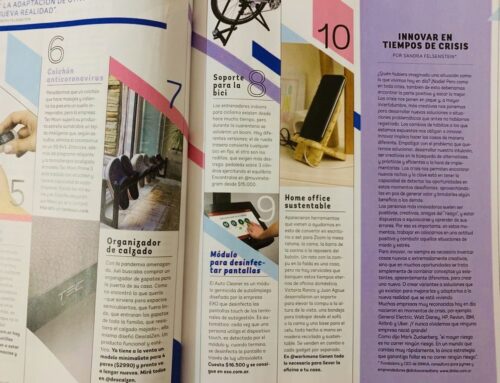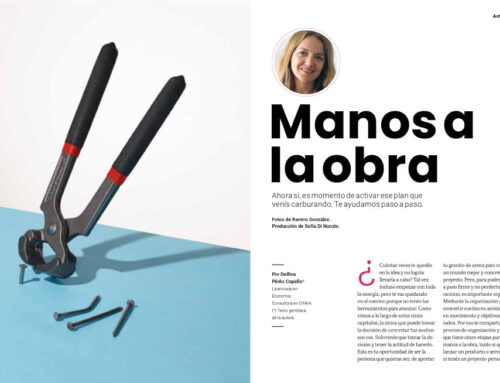In an exclusive talk for Massnegocios, the director of Dinkka tells how to achieve small business success.
How can an SME optimize your resources?
The first step towards the optimization of resources is to obtain a good diagnosis of situation. Each SME is different, each different situation, so it is essential to carry out a comprehensive review of the company to detect key areas of improvement, and understand the general state, and then develop an action plan. In this sense, the analysis of the information is essential to understand where the business is leveled and where there are more important shortcomings in terms of optimization of existing resources. That is, it is very important to identify where focus should be made so that the use of resources is aligned with the company's objectives.
What suggestions would give SMEs to improve internal processes?
Change resistance is usual in companies members. It is common that when working with the modification of internal processes, claims arise like "Why are we going to change this if it works?", "We have done this for this way, why change it?" Or "If in this way the business pays positively, why should we modify something?" These proposals are usual and that is why it is highlighted from Dinkka to the management of the company, which when making the decision of change, the conviction with which it is made, to convey confidence in the decision. Otherwise, if the businessman is not convinced, the change process has few chances of success.
Likewise, emphasis should be made when a change process is raised, in which it is the best solution found in the situation. That is, the leaders and their collaborators are not judged, but the external look allows you to see things from a different approach.
On the other hand, processes optimization should occur as a result of the information analysis stage. That is, this need should be detached from the conclusions obtained from the management numbers that show where the business is signed. If processes begins reformulating without understanding why the change is intended, it is highly likely that everything returns to the initial state soon.
It is essential to simplify processes, make them simpler and simpler. Keep in mind that the final consumer "pays for what generates value." That is, internal bureaucratic processes use time and resources that as a consequence generate costs in products or services, which are not perceived as benefits for the consumer.
The objectivity in the evaluation and reformulation of processes is fundamental, which is why in many cases it is resolved to hire experts who have an objective, external and “fresh” look, with the experience of having reflected certain types of solutions successfully in other companies.
What should an SME do to develop your business strategy?
To develop an effective strategy, the starting point is the knowledge of where the business is signed. Management boards are an essential tool to know the reality of the company, define where you want to go; Then measure results. Thus, understanding the initial situation and raising where you want to get, is that the definition of a strategy becomes clearer.
What can a SME do with low economic resources to manage the relationship with your clients?
There are many tools that allow managing the relationship with customers without the need to invest too much. Social networks, mailing, direct marketing, surveys, bring companies with their customers without important disbursements.
By having scarce resources, their assignment must be efficient, so the clear identification of the client profile is important and then do effective actions. To achieve this it is essential to know the client in depth, and have a reliable and updated database of current and potential customers.
In relation to commercial management, it is convenient to have boards that allow assessing customer satisfaction, rotation of them, contacts per month, etc.
How to guide an SME when it is unfocused from your business goal?
By raising clear strategies, tangible objectives, a mission, commercial plan and preparing measurable parameters to evaluate the course of action, the goal of where "you want to go" is "focused" much better. On the other hand, the measurements serve as a traffic light to detect deviations and then go to contingency action plans to clearly identify objectives and reflect actions that could have diverted.
What should an entrepreneur do to start your SME project?
It is advisable to make a feasibility analysis of the project. As a starting point, it is essential to make a market study to know in depth the potential. That is, to know thoroughly: tastes, behavior, preferences of those who could be customers. On the other hand, the competition must be analyzed to know and understand how the market that you want to penetrate currently works.
It is important to look for a clear differentiation of the product or service to be offered (sometimes this occurs in the design of the product or service, sometimes in the form of distribution, post-sale service, etc).
Then, propose a clear commercial strategy and operational plan for how to carry out the project, and from here the structure that will be necessary to implement, such as the work team.
To evaluate the financial economic viability of the project, relevant estimates must be made in terms of sales, costs, general expenses, through different tools, it can be analyzed whether the project is economically or not attractive.
Questions usually arise in relation to whether to undertake alone or with a partner or if financing will be sought through loan, investors, etc.
What does an SME have to make to maximize your performance?
Dinkka puts the focus on the maximization of SME performance, and in this sense, there are different ways of doing so: decreasing costs of the company or increasing sales.
The first point is attacked with the optimization of resources and processes, eliminating tasks that do not add value perceived by customers and develop more effective efforts (important point here is the effective delegation of the entrepreneur towards its collaborators to assign time to strategic definitions and not operational tasks).
As for the second, the important thing is to leverage the product and customer segment that generates greater performance to the company. That is, "sell better" and not "sell more." We must be able to identify, all the business units or products that are offered, which generate better results and put "the energy there." The same happens when segmenting types of customers: there is always a group to which it is worth focusing.
If energies and resources are focused on leverage what generates greater performance (sell better), it is more efficient than if it puts efforts to sell more generally. That is, it is more efficient to increase sales focused on products that have greater margin, than to increase 50% general sales without taking into account this distinction.
The same goes for customers. If sales strategies focused on customers that generate more yield and more leverage the business are developed, more efficient results are obtained. Do not understand what is mentioned as neglecting the rest, but yes, establish a general service level and see where to "point the cannons."
Pareto's law applicable to both concepts states that 80% of results are generated by 20% of customers/products and vice versa, that is, 20% results per 80% of products/customers. This implies that it is convenient to segment customers/products and see where to focus on leveraging the business.
DINKA in numbers
It has worked with more than 25 SMEs, on commercial management projects and resource optimization. Dinkka has accompanied 20 entrepreneurs in the armed of the Business Project Plan and Start Up of the same.
90% consultations are related to issues such as:
- Entrepreneurs' concern to be too involved in day -to -day issues, which as a consequence generates lack of time to think strategically.
- Doubt because the sales that are generated in the company are not embodied in results.
- Need to increase sales.
- How to do to leverage the result of the company.
How should an entrepreneur not be overwhelmed in how to manage every day?
Everything revolves around the effective delegation and the leadership capacity of the entrepreneur, since the goal is for him to learn not to get involved in daily operational tasks, but develop leader capabilities and spend more time think strategically. For this, it is necessary:
- Assemble an efficient work team, according to the needs of the company.
- Develop effective control instances to achieve autonomy and mastery of the work team (through control boards, management numbers, which allow the entrepreneur to lead through control, without the need for their active participation in the operating day to day)
- Clear work processes and procedures.
Fuente:
Ing. Sandra Felsenstein








